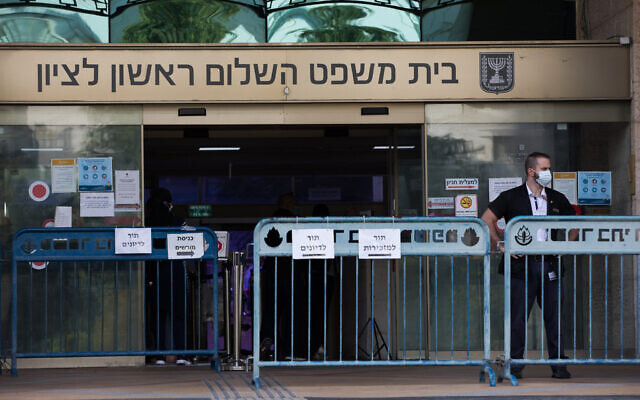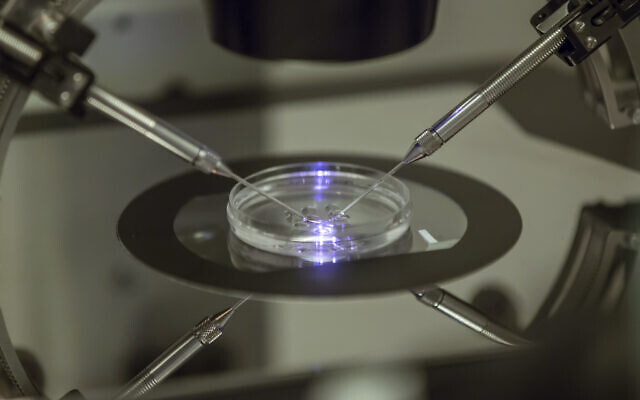Six couples will be permitted to undergo genetic testing after they were identified as among the most likely biological parents of an embryo that was mistakenly implemented in a woman earlier this year, a court said Wednesday.
The woman who carried the child has since given birth and is raising the baby girl with her partner. The couple has vowed to fight any attempt to remove the infant from their custody.
The Rishon Lezion Magistrate’s Court ruled that five couples can be initially tested, with the sixth to be sampled if the others show up negative, the Kan public broadcaster reported.
The six couples are among 22 who were identified by the Assuta Medical Center, where the IVF error was made, as having the greatest chance of being the genetic parents of the girl.
The six couples had appealed to the court for permission to undergo testing after the Health Ministry halted its own efforts to trace the biological parents.
Get The Times of Israel's Daily Edition by email and never miss our top stories
“Conducting the test is in line with the minor’s interest in knowing her origin,” Judge Hani Shira said.

The main entrance to the Magistrate’s Court in Rishon LeZzon October 28, 2020. (Nati Shohat/Flash90)
She rejected a request from the couple who gave birth to the girl that testing be delayed for a number of years.
“I could not ignore the situation of the applicants and the fact that they — like the respondents — were caught against their will in the chaotic situation,” Shira said.
“They should not be denied the possibility of finding out their relationship to the minor, thereby destroying their possibility of ever tracing their biological child.”
“The uncertainty in which the applicants live, along with the hope that the minor may be carrying their genetic material, also causes them human suffering that must be put to an end by conducting the test,” the judge said.
The couple raising the baby, whom previous testing already showed has no genetic tie to the girl, filed an appeal against the ruling and asked that sampling be put on hold, Channel 13 reported.
Attorneys for the parents said in a statement: “The decision does not reflect the best interests of the girl and her parents are raising her with love and devotion.”
“The decision does not address the request of the family and the parents, and does not suit the girl’s right to privacy and confidentiality about her genetic information,” the statement said.
Oshrit Abergil, 42, one of those who was approved for immediate testing, told the Ynet news site of the relief she felt when she heard the court had agreed to the testing.
She said the legal process leading up to the ruling has been going on for weeks and now she hopes to undergo testing as soon as possible.
“If I find out that this is my baby, I will fight for her and I will want to raise her. I will not give her up,” she said.
Abergil married 23 years ago but so far she and her husband have not had children, despite trying expensive, and sometimes grueling, IVF procedures.
Two years ago she became pregnant but lost the baby after six months, a “crisis that was hard for us to recover from.”
Abergil said that when the story about the embryo mix-up first broke she did not think she was tied to the case.
“But when they published the dates on which the mother was in treatment, I realized that we were on the same dates, and the sky fell in on us,” she said.
She said she and her partner have been on edge ever since.
“We wanted to get answers as quickly as possible to know if the baby that was born is related to us. Our whole lives have stopped,” she explained.
Abergil sympathized with the woman who gave birth to the baby but noted that “just as she is a victim, we are also victims of this situation, and we must find out.”
“If the biological parents are not found, then of course she has to raise the baby,” Abergil said of the other woman.
“But there are parents here who have undergone difficult treatments, who have created embryos, and perhaps the embryo was taken from them and they don’t know about it,” she said.

Illustrative: An in vitro fertilization embryologist works on a petri dish at a fertility clinic in London, August 14, 2013. (AP Photo/Sang Tan)
The child was born in late October, shortly after revelations of the mix-up sparked a national firestorm.
The infant recently underwent heart surgery at the Sheba Medical Center, Kan reported.
On Monday, the couple raising the girl filed a lawsuit against Assuta claiming NIS 10 million ($2.9 million) over the mishap.
Channel 12 said the lawsuit will focus on alleged negligence at Assuta Rishon Lezion’s fertility clinic as well as the distress caused to the couple.
The Health Ministry initially sought to find the child’s biological parents, but after one couple singled out as the most likely parents was ruled out by tests, officials announced late last month that they would halt the search.
The Health Ministry considered shuttering the IVF unit at Assuta following the error but eventually decided not to do so. However, it demanded that the department trim its operations by 50 percent — from 10,000 fertilization treatments a year to 5,000.


